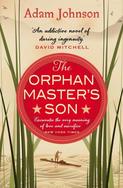
If you're going to be traumatised by a novel, it must be a good one. If you're going to go to bed, anxious at what monsters your dreams will churn up, let it be on account of a story worthy of the Pulitzer Prize. After nearly 600 pages in the Democratic Republic of North Korea, at least you you can go back to your own life when it's over. Such a pity the same can't be said of the novel's protagonist, the orphan, Jun Do. Or should that be Commander Ga?
It’s not that there are no stories in this imagined North Korea. Like children in nursery school, or the days of single channel TV, everyone must attend to the year’s Best North Korean Story, broadcast into their homes and workplaces through the ever-present loudspeakers. Orphans, the lowest of the low in this society, are taught, through an allegorical story, that their lives have been saved by the eternal love of Kim Jong Il. Even the hardened interrogators can quote of their favourite lines from the moralising movies of the state cinema.
Yet these aren’t stories I’d be proud to write, or look forward to settling down to read. In a society where orphans are scapegoated rather than pitied, stories don’t seem to facilitate empathy in those who hear or read them. In a country where creativity is stifled, stories are designed to keep people in their place. Children, weaned on a diet of propaganda, are confused on being told a tale in which nothing is glorified. With little personal autonomy, character is without meaning. Stories don’t reveal a deeper truth, but turn it upside down, yet no-one dares acknowledge the emperor has no clothes:
there was only one penalty, the ultimate one, for questioning reality, how a citizen could fall into great jeopardy for simply noticing that realities had changed (p544).
When you have a subject’s biography, there is nothing between the citizen and the state (p239).
If only he had the humility to attend a creative writing course, or to heed his own advice about treasuring self-criticism. Or to read the novel that features him: if you look closely enough, The Orphan Master’s Son is replete with writerly advice, as manifest in these examples on character, openings, narrative voice and structure:
‘Character is destiny,’ we told her, reminding her of the famous quote from Kim Il Sung. ‘That means that once we discover the inside of a subject, what makes him tick, we not only know everything he’s done but everything he will do.’ (p244)
Notice, too, how he began his story as a love story might open, with beauty and an insight that combined pity with the need to protect (p246).
And it gave us chills the way he told the story, as if it actually was about him and not a character he had learned about, as if he personally had nearly died of cold, hunger, fever, and mine mishaps, as if he himself had licked honey from the Dear Leader’s claws. But such is the universal power of storytelling (p274).
Different kinds of fabric are sewn together to say something about a person’s life (p488).
As the novel hurtles towards its climax, we find pockets of redemption within the bleakness. Parents, preparing for their children for the possibility of having to denounce them, teach them the difference between what they know to be true in their hearts and the official line. Even the interrogator-biographer is changed through the storying process, finally realising that his records of others’ lives is primarily a means to understanding his own.
As the protagonist finds freedom through authoring his own story, and safeguarding his secret from his interrogators, he discovers the power of stories as entities in themselves:
perhaps it was better for the story to have no purpose, that it be nothing other than the thing it was, spontaneous and original as it wandered toward its own conclusion (p492).
Update: in the absence of blog comments, I'm posting snippets of conversation from Twitter.
@Annecdotist thanks so much for sharing with me. Shall check out your other reviews.
— Michelle (@mamabook) August 30, 2013
Although fiction, The Orphan Master's Son feels like we have our first document of truth of North Korea. http://t.co/jLuNGiJxmc
— Offbeat Reviews (@OffbeatReviews) August 30, 2013
@Annecdotist Wow, this is really well written! Thanks for sharing. Hadn't actually thought about the creative aspect - makes total sense!
— Offbeat Reviews (@OffbeatReviews) September 1, 2013





















 RSS Feed
RSS Feed





















